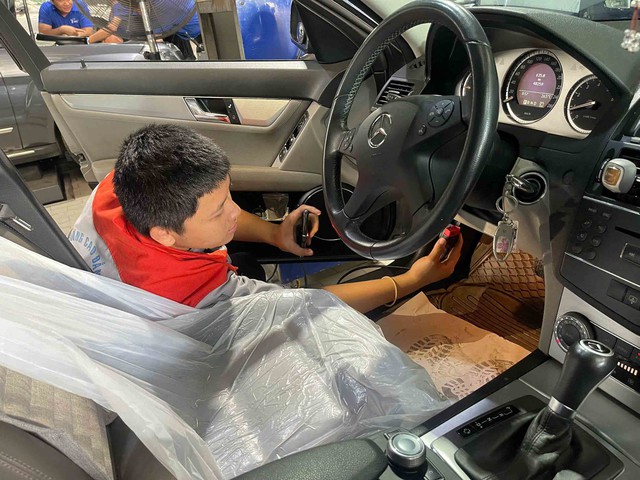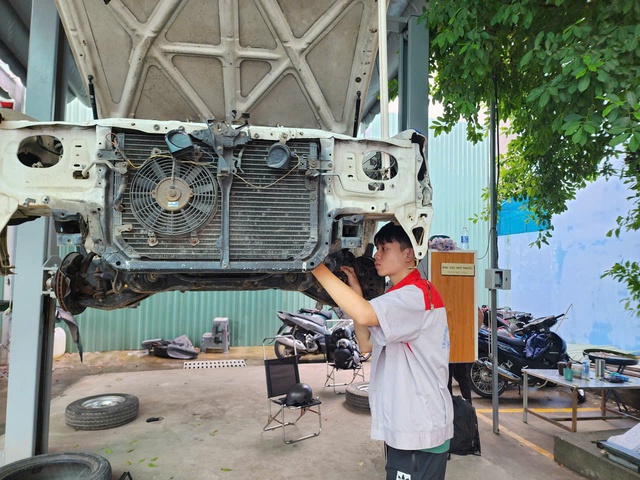Vien Dong College To Attend the 11th National Patriotic Emulation Congress 2025
18.12.2025
What are you looking for?
The information that only 23.4% of enterprises plan to recruit new graduates or interns in the second quarter of 2025 has caused students to worry that the employment opportunity for new graduates is narrowing.
However, in reality, the labor market picture is not entirely bleak. In certain specific industries, opportunities remain wide open for newcomers. The question is, what do students need to prepare, and what should schools and businesses do to jointly untie this knot?
It’s not necessarily about finding experienced people but multitaskers
Mr. Bùi Tiến Đạt – HR Director of Đông Phương Group (Hồ Chí Minh City), which operates 9 wedding & convention centers with 63 banquet halls serving millions of customers annually, stated that the demand for human resources in the hospitality industry is always very high. “On just one peak day, Đông Phương Group might need at least 3,600 workers. That’s why we have connected with many universities, colleges, and vocational schools to train and recruit students and interns,” Mr. Đạt explained the reason for partnering with educational institutions.

Students from the Automotive Engineering Technology department at Viễn Đông College intern at the company. This is an effective way that helps students quickly gain practical experience.
Internal data from this enterprise shows that each year, around 100 students from Viễn Đông College intern at the company, with about 50 later recruited as official employees. In addition, programs such as “Enterprise Modules” and “Management Trainee” provide graduates with clear career paths, rather than starting only at the lowest positions.
A luxury hotel system also recognizes the positive value of new graduates. Ms. Nguyễn Hồng Thắm – HR Director of The Reverie Saigon, affirmed that this hotel alone has had 45 students from Saigon Tourism College who have worked or are currently working there. However, she noted that the hotel’s main customer personas primarily come from the US, Japan, Korea, the UK, and China. “If students wish to work in an international environment, proficiency in English and the other mentioned languages is a prerequisite, a plus point for their resumes compared to other candidates,” Ms. Thắm emphasized.
Ms. Trần Thị Ngọc Thảo – CEO of TMS, founder of the HR Talks community – commented: “With the current surplus labor, enterprises aren’t necessarily looking for experienced people but for multitaskers with diverse skills. Therefore, if new graduates can meet enterprise expectations, they are still welcomed.”
“Some industries are still ready to ‘mentor’ newcomers, such as: customer service, telesales, customer care, education – language centers, online sales… These jobs are easy to train, have high demand, and are suitable for students to accumulate foundational skills,” Ms. Thảo stated.
From a training perspective, Master Phan Thị Lệ Thu, Vice Principal of Vien Dong College (HCMC), frankly stated that many students graduate holding a degree but are not accepted by enterprises because the training is too theoretical and lacks practical experience. Master Thu also pointed out many reasons why businesses do not choose new graduates, including the fact that many schools provide training that is disconnected from reality, and there is a significant gap between the training curriculum and the actual needs of enterprises. “When enterprises recruit, they have to spend additional time and money on retraining.”
Connecting the lecture hall and the enterprise
According to Master Phan Thị Lệ Thu, educational institutions are forced to link training with enterprises from the beginning. Enterprises participate in teaching, provide feedback on the curriculum, and even organize courses right in the working environment.
In reality, some schools have been strengthening their partnerships with enterprises in training. For example, Viễn Đông College has collaborated with Đông Phương Group in delivering the F&B (Food & Beverage) module. “Previously, the college only invited lecturers from enterprises to teach the F&B module, but now this module is taught directly at the enterprise site,” Ms. Thu explained, adding that this approach allows graduates to more easily connect with enterprises, while also giving enterprises a clearer basis to recruit fresh graduates.
Mr. Bùi Tiến Đạt said the Enterprise module includes both theory and practice. “In one session, students will study and practice for about 160 hours, equivalent to 8 weeks. Each week, they both study and work directly at the enterprise”, he added.
Hồ Chí Minh City College of Economics has implemented a “dual training” model for many years, with many restaurant management subjects taught directly at hotels. Master Trần Văn Tú, the school’s Principal, said the school also has close links with many banks to teach finance and banking.
Meanwhile, according to Dr. Đinh Văn Đệ, Acting Principal of Ly Tu Trong College (HCMC), the school strengthens and focuses on expanding cooperative relationships with domestic and foreign enterprises, closely coordinating with businesses in training activities: enrollment consulting, building training programs and curricula; career counseling by inviting businesses to participate in the school’s professional councils; participating in teaching, instructor training, scientific research, job placement for students, supporting training equipment, and sponsoring scholarships…

The training program needs to meet the demands of enterprises.
Skills that students need to equip
With over 10 years supporting student internship, hotel tours, and career sharing, Mr. Phan Trường Duy, Training and Development Manager at Vinpearl Landmark 81 (Marriott International), highly appreciates the confidence, passion for the profession, and professional demeanor of many young people.
From an HR perspective, Ms. Trần Thị Ngọc Thảo was straightforward: “Facing the current difficult situation, enterprises consider carefully when recruiting and will certainly open up their doors to new graduates as long as the candidates show the recruiter that they are multi-skilled, flexibly adaptive, and have a positive mindset.”
Ms. Thảo pointed out the limitations of new workers, such as: lack of real-world experience, which equates to a lack of problem-solving skills and time management skills. Because of these things, the group of new graduates will find it difficult to build trust with employers.
According to her, besides equipping themselves with knowledge, what students lack is the most basic set of soft skills: problem-solving, effective communication, time management, and teamwork skills. Schools teach students basic knowledge, but when stepping out into the real world, students need skills to transform that knowledge into competence.
“Therefore, never send employers a ‘blank CV with no experience’. Take advantage of the time to gain practical experience, take on any suitable job to accumulate experience, because only by working will you mature,” advised Ms. Thao.
Lecturers also “apprentice” at enterprises
Not only innovating the training program, lecturers at Viễn Đông College must continuously improve their knowledge and update on technology at enterprises. Master Phan Thị Lệ Thu, the school’s Vice Principal, believes that lecturers who only teach at school will struggle to keep up with new technology. “Some people graduated over 10 years ago, while in society, technology, especially in technical or medical fields, changes every day. Therefore, annually, the school’s lecturers must go to study at enterprises. The time usually lasts about 2 months and is linked to internship modules. Particularly, during student internship periods, lecturers not only observe or support but must also directly participate as genuine trainees themselves,” shared Master Thu.
